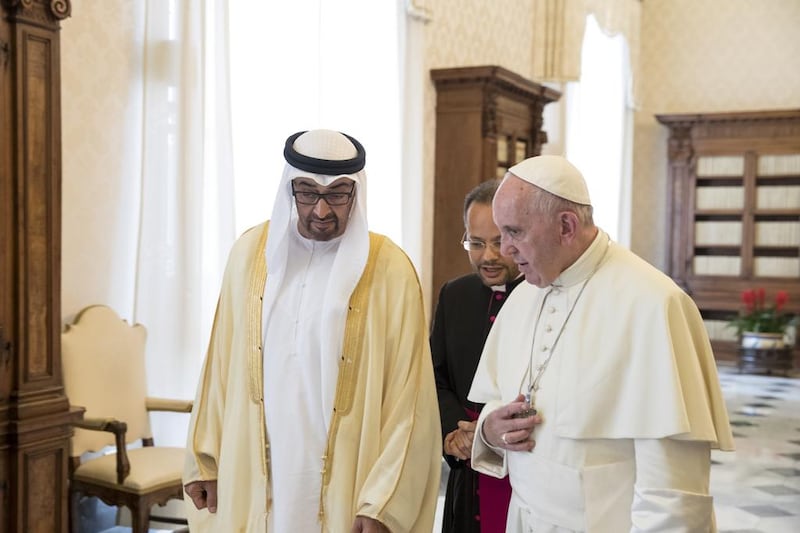I was one of the thousands of Christians, from all corners of the world, who worshipped at the Catholic cathedral in Abu Dhabi for the eight years of my stay in the UAE.
During mass, one could hear the call to prayer wafting through the walls from a mosque whose structure is integrated into a sprawling compound comprising Roman Catholic, Coptic and Anglican churches, among others.
Christianity is under threat in the Arab world, partly because of the rise of fundamentalist groups in Iraq and Syria, but also because declining birth rates have reduced numbers as a proportion of total population. In the GCC countries, however, numbers are generally growing, largely as a result of labour migration.
Of these countries, the UAE has worked the hardest to assimilate its estimated 900,000 Christian residents, making land and resources available for church building and preserving pre-Islamic sites of Christian significance.
This might be seen by cynical observers as a necessary price to pay for much needed expatriate labour, but the UAE has gone well beyond this, seeking to build pastoral as well as diplomatic bridges with the Christian world at a time when fundamentalism and religious triumphalism are on the rise in the region.
The visit of Sheikh Mohammed bin Zayed, Crown Prince of Abu Dhabi and Deputy Supreme Commander of the Armed Forces, to the Vatican last week stems from this policy of interfaith engagement. It stands as a reminder of the UAE’s rejection of religious extremism and its determination to take up its own role in the family of nations.
On paper, at least, this tiny walled enclave within the City of Rome presided over by the Pope and populated mostly by a large, clerical civil service overseeing a flock of more than 1.2 billion Catholics does not amount to much in terms of direct geopolitical heft.
But a generally secularised West still tends to prick up its ears when the Pope says something or meets someone. The Roman Catholic Church has always been part of Europe’s cultural and historical DNA.
When the barbarian hordes swept across the decaying Roman empire, it was the church that embodied and preserved Roman administrative structures and practices, libraries and educational establishments and, crucially, offered continuity, order and association with one of history’s greatest civilisations.
Despite being the world’s smallest sovereign state and its apparent preoccupation with the spiritual over secular affairs, the Holy See enjoys enormous moral authority and diplomatic influence. And moral authority, where it is brought to bear on secular affairs, can prove to be socially – even politically – transformative.
The influence of John Paul II, a Polish citizen with direct experience of Soviet oppression, was vital to the demise of communism. His outspoken, liberationist approach to communism greatly amplified the efforts of western world leaders. Now, the continent faces a similar political and moral fault line, in which extremism is threatening to divide communities along cultural and religious lines.
The current Pope Francis, a Jesuit who took on the name of the founder of the Franciscan order, knows that history stands again at a cultural crossroads wrought in part by globalisation but also by the troubles in the Middle East and resulting migration patterns.
Christendom of old, especially at a time of Ottoman expansion, was characterised in significant part by its adversarial relationship with Islam. Today, with parts of the Middle East unravelling and with subsequent terrorist attacks on the streets of European cities, there is a danger that these enmities might re-establish themselves. Indeed, such a scenario is a direct “war aim” of the ISIL strategists.
The Vatican visit, eight years after diplomatic relations were established, is a statement of intent. It serves as recognition that the current trend towards mistrust between the Islamic world and the West, between Muslims and Christians, between European Muslims and their non-Muslim neighbours, must not be allowed to grow.
Further, as Sheikh Mohammed said during his visit, efforts at conflating terrorism and extremism with Islam should be resisted, as should gratuitous insults directed at faith.
Pope Francis has for his part refused to be drawn into broad condemnation of a faith shared by so many Europeans. Speaking after the horrific murder by a radicalised extremist of a priest celebrating Mass in Rouen, he said: “It is not right to identify Islam with terrorism. It is not right and it is not true.”
Social injustice and what he termed the “idolatry” of money were the roots of terrorism, he said.
Pope Francis worked for years among the dispossessed in Buenos Aires, Argentina. He believes that violence, whether political or religious, stems first from poverty – a sentiment echoed by Sheikh Mohammed last week.
It remains to be seen whether the UAE delegation’s visit will be followed by a visit by Pope Francis to the UAE – the first visit by a pontiff to the Arabian Peninsula. Such a visit would act as a powerful call for solidarity between faiths and cultures and a rejection of the notion that Christianity no longer has a home in the region of its birth.
Martin Newland is a former editor in chief of The National





